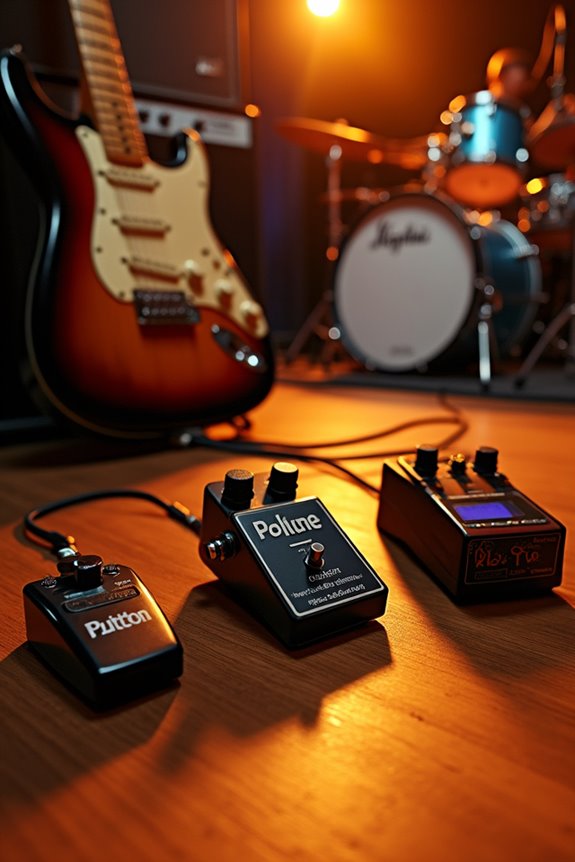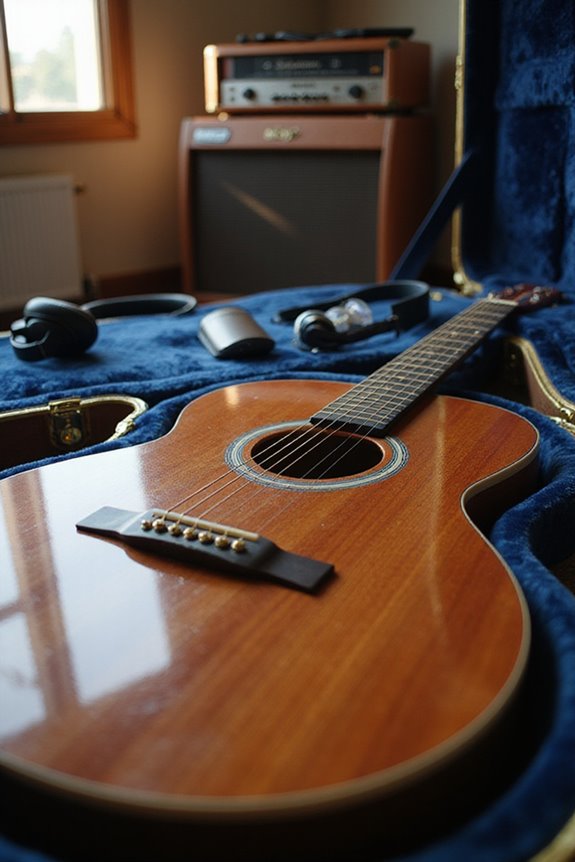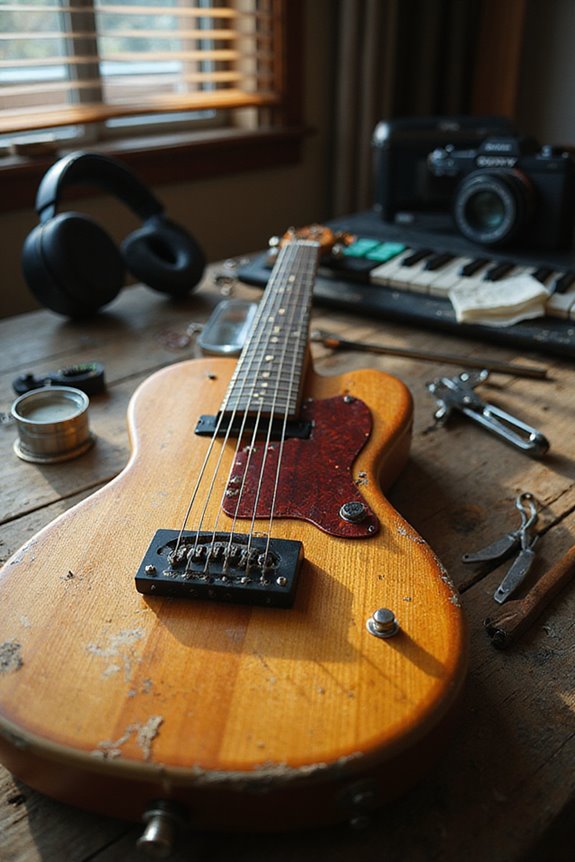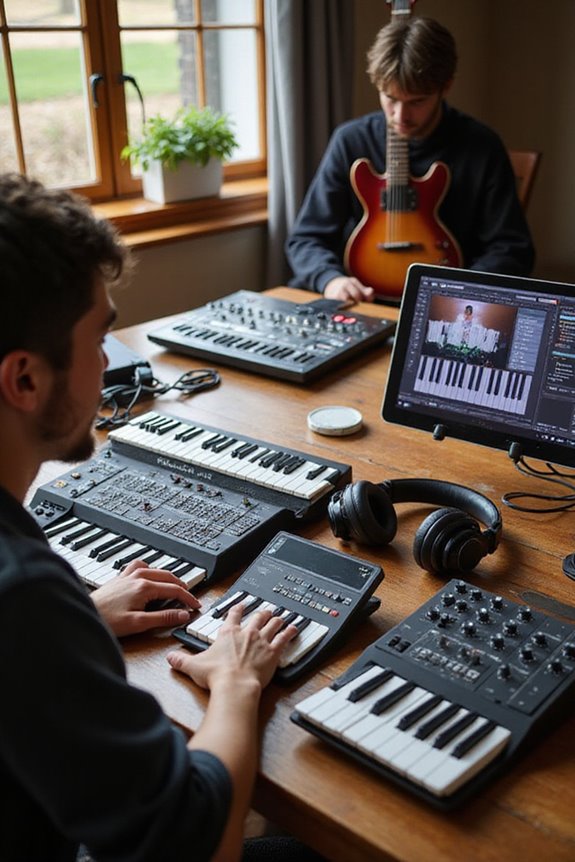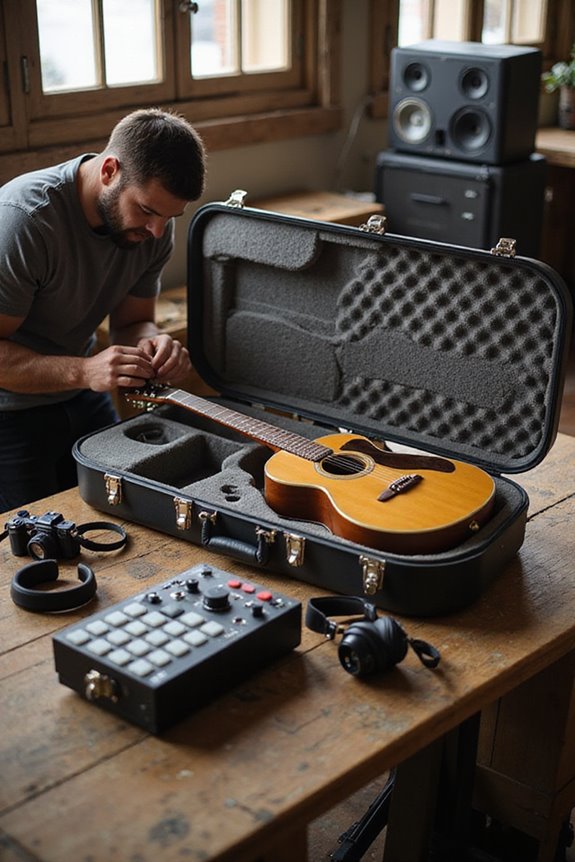When it comes to the best guitar tuners for live shows, we’re fans of the Boss TU-3 for its ruggedness and accuracy. The Korg Pitchblack X offers versatile display modes and options for true bypass, making it a solid choice, too. If you prefer a clip-on, the Peterson StroboClip HD provides exceptional precision. We recommend considering factors like build quality, tuning speed, and visibility during performances. Stick with us to uncover even more great options for your setup.
Key Takeaways
- Durability: Choose pedal tuners like Boss TU-3 for rugged build quality, ensuring reliability during live performances.
- Accuracy: Opt for strobe tuners, such as Peterson StroboStomp, which provide precision tuning down to 0.1 cent for flawless intonation.
- Visibility: Select tuners with large, bright displays, like Sonic Research Turbo Tuner ST-300, to ensure readability under varying stage lights.
- Speed: Look for tuners with fast response times to minimize downtime, allowing for quick adjustments between songs during shows.
- Portability: Clip-on tuners like TC Electronic PolyTune Clip are compact and convenient, ideal for quick tuning in quieter settings without interrupting performances.
Top Pedal Tuners for Live Performance
When it comes to live performances, having a dependable pedal tuner can make all the difference. We’ve found that models like the Boss TU-3 stand out for their pedal durability and rugged build, making them an industry standard for gigs. The Korg Pitchblack X impresses us with its multiple display modes and accuracy, offering both true and buffered bypass options. For those needing ultra-precision, the Peterson StroboStomp delivers strobe tuning accuracy down to 0.1 cent. Visibility is essential too; the Sonic Research Turbo Tuner ST-300 excels in both dark and bright environments. With advancements in tuner technology, these options guarantee we stay in tune, focused on our performance without worrying about gear reliability.
Best Clip-On Tuners for Stage Use
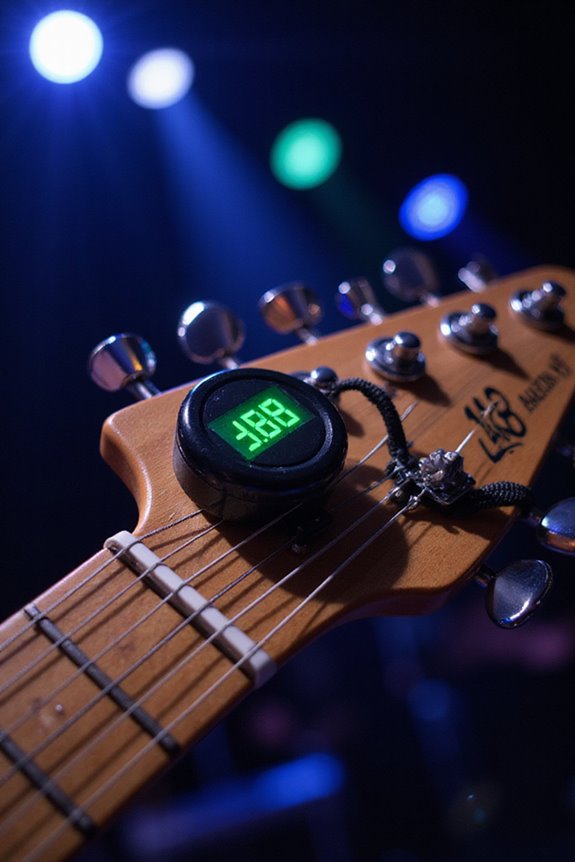
For musicians on stage, clip-on tuners offer a compact and convenient alternative to pedal tuners, ensuring that we stay in tune without interrupting our performance. Among the top tuner brands, the Peterson StroboClip HD stands out with its 0.1-cent precision, ideal for maintaining perfect intonation. Meanwhile, the TC Electronic PolyTune Clip impresses with its polyphonic tuning, allowing us to check all strings at once, speeding up our setup. Although Snark tuners are popular, they can be sensitive to ambient noise, which might affect accuracy during live shows. Ultimately, selecting the right clip-on tuner enhances our performance feedback, helping us focus on playing while staying in tune effortlessly.
Key Features to Consider in Live Tuners
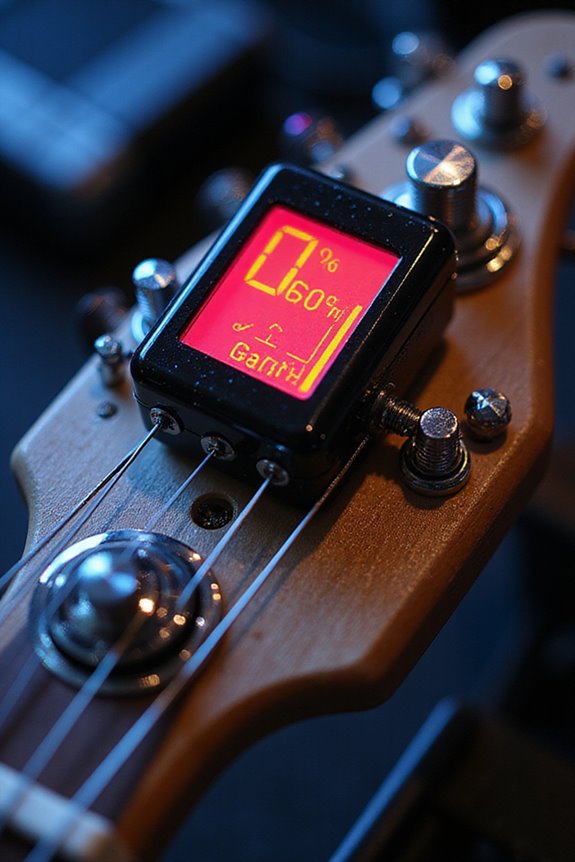
Choosing the right tuner for live performances can greatly impact our on-stage experience. When selecting a tuner, we should prioritize tuning speed and build quality. A fast response time minimizes downtime, allowing us to stay in the moment. Look for tuners with large, bright displays that remain visible under varying lighting conditions—like the Peterson Strobostomp, which excels even in direct sunlight.
Durable, metal enclosures are essential, as they withstand the rigors of touring. Sturdy footswitches and protective casings can prevent damage during intense performances. Additionally, features like mute functions and easy integration into pedalboards enhance functionality, guaranteeing seamless shifts between songs. By focusing on these key features, we can guarantee our live shows run smoothly and effortlessly.
Accuracy and Reliability of Guitar Tuners
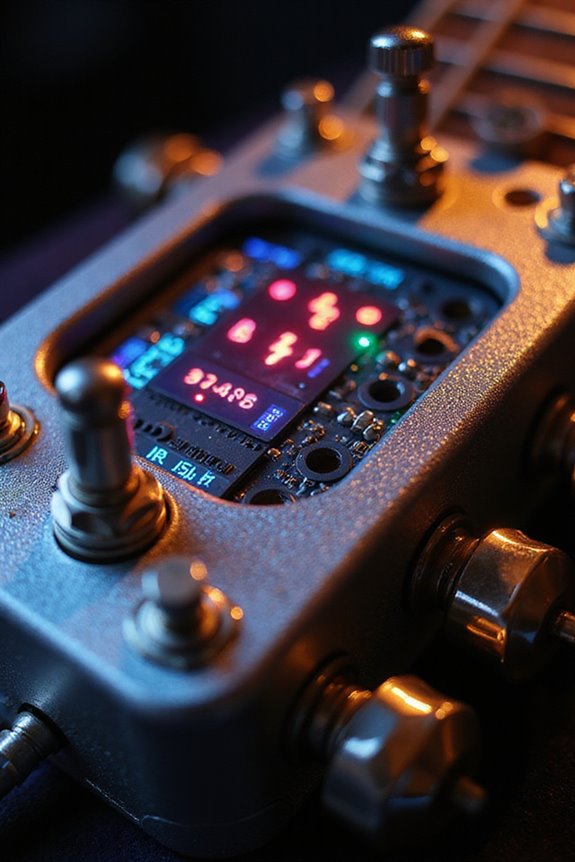
While we might think that precision is everything when it comes to guitar tuners, understanding their accuracy and reliability in live settings is vital for a smooth performance. Most pedal tuners offer an accuracy of +/- 1 cent, which is usually more than sufficient for live gigs. In contrast, professional strobe tuners can achieve remarkable accuracy of +/- 0.1 cent, but such precision often exceeds what audiences can perceive.
Reliable pitch detection is essential, as mechanical factors like tuning peg gear ratios can affect tuning stability. Regular tuner calibration helps maintain performance consistency, especially in varying environments. Ultimately, being “close enough” guarantees pleasant sound without the stress of chasing extreme accuracy during a show.
Comparison of Different Tuner Types
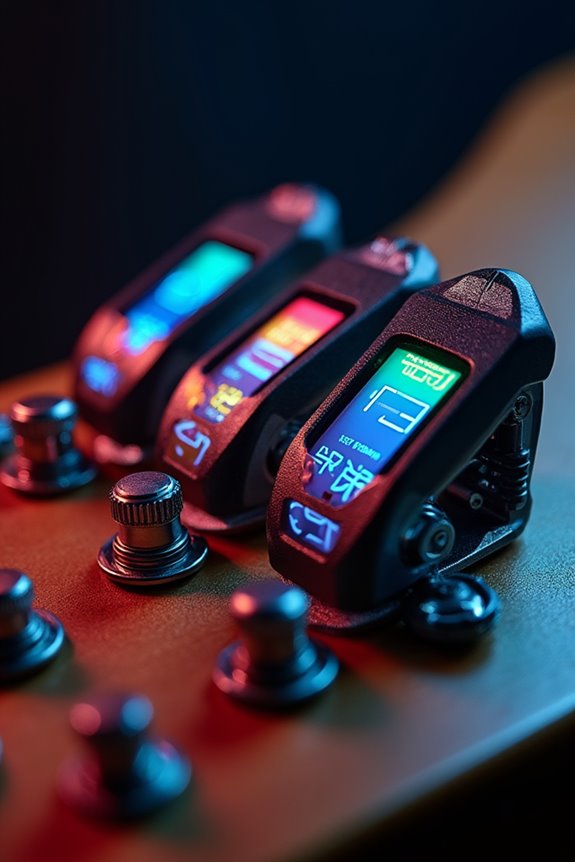
When it comes to live performances, the type of guitar tuner we choose can greatly impact our overall experience. Clip-on tuners offer excellent tuner portability, ideal for quieter settings, but their limited battery life might restrict long use. Pedal tuners provide unmatched tuner durability and stability, making them a favorite among touring musicians, especially for their bright displays in dim lighting. Rackmount tuners are the largest and most expensive, suited for professional venues, but their size limits portability. For precision, strobe tuners shine with unmatched accuracy, although they require user expertise. Automatic tuners, like TronicalTune, excel in versatility, mechanically adjusting for alternate tunings, saving us time during performances. Each type has its strengths, catering to different live performance needs.
Cost Considerations for Live Performance Tuners
Understanding the cost of guitar tuners for live performances can greatly influence our purchasing decisions. When we consider tuner brands, we find a range of pricing strategies that impact our choices. For instance, clip-on tuners like the Fender FT-1 are budget-friendly, typically priced between $10 and $30, ideal for smaller shows. On the other hand, pedal tuners such as the Boss TU-3 and TC Electronic PolyTune 3 offer a balance of performance and cost, generally ranging from $50 to $150. For those seeking automation, TronicalTune systems, while pricier at $300 to $500, can enhance convenience. Ultimately, investing in a reliable tuner can save us from frequent replacements and guarantee precision during performances.
Frequently Asked Questions
Can I Use a Tuner With Alternate Tuning Setups?
As we navigate through the vibrant world of music, we can confidently use tuners with alternate tuning options. By considering tuner accuracy, we guarantee our strings resonate perfectly, regardless of the tuning setup we choose.
How Do I Calibrate My Tuner to Concert Pitch?
To calibrate our tuner to concert pitch, we’ll access the calibration settings, set it to 440 Hz, and double-check with a tuning fork. Using precise calibration techniques guarantees our guitar stays in tune with others.
What Is the Best Tuning Method for Electric vs. Acoustic Guitars?
So, we think tuning’s a walk in the park, right? For electric guitars, let’s stick to pedal tuners—precision’s key! Acoustic guitars? Clip-ons are handy, but they might just faint from the venue’s noise!
Are There Tuners Compatible With Bass Guitars and Other Instruments?
Yes, there are tuners that offer bass compatibility along with features for other instruments. We’ve found multi-instrument tuners particularly useful, allowing us to seamlessly switch between tuning bass guitars, electric guitars, and more.
How Can I Maintain My Tuner for Longevity?
To maintain our tuners for longevity, we should focus on proper tuner storage and battery care. Regular cleaning, lubrication, and monitoring humidity will keep them performing well, ensuring our instruments stay in top shape.

